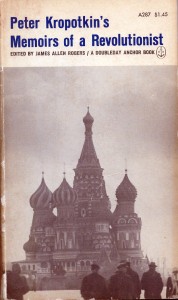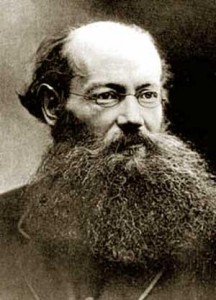 Kropotkin’s autobiography (1842-1921), like that of Alexander Herzen, owes its remarkable quality to the brilliant presentation of an unusual story by an original and gifted personality. When we start reading from page 1 we see in front of us “Moscow is a city of slow historical growth, and down to the present time its different parts have wonderfully well retained the features which have been stamped upon them in the slow course of history. The Trans-Moskva River district, with its broad, sleepy streets…”
Kropotkin’s autobiography (1842-1921), like that of Alexander Herzen, owes its remarkable quality to the brilliant presentation of an unusual story by an original and gifted personality. When we start reading from page 1 we see in front of us “Moscow is a city of slow historical growth, and down to the present time its different parts have wonderfully well retained the features which have been stamped upon them in the slow course of history. The Trans-Moskva River district, with its broad, sleepy streets…”
The image of the ancient city became so vivid under his pen that when he came again to Moscow to visit with his father dying Alexei Petrovich Kropotkin “continued to live in the old style, in the Staraia Konushennaia, but around him everything in this aristocratic quarter had changed. The rich serf-owners, who once were so prominent there, had gone. Their houses houses had been taken by “the intuders”,-rich merchants, railway builders, and the like, – while in nearly one of the old families which remained in the Old Equerries’ Quarter a young life struggled to assert its rights upon the ruins of the old one. One thing worried him, however. He had expected to see us as repentant sons, imploring his support. But when he tried to direct conversation into that channel, my brothe and I stopped him with such a cheerful “Don’t bother about that; we get on very nicely”, that he was still more bewildered.”
“When I was called home again from Finland, I hurried to Moscow, to find the burial ceremony just beginning, in that same old red church where my father had been baptised, and where the last prayers had been said over his mother…”
While belonging to the highest rank of Russian aristocracy, Peter Kropotkin became a revolutionary and later an exile, only to find himself after the October Revolution of 1917 as tragically opposed to the Bolsheviks as he had been to the Tzarist autocracy.
His life time span between 1842 and 1921 showed a great development of a human being from the mutual sympathetic attitude of servants and him from motherless childhood, always inquisitive mind at home private education, then at St. Petersburg Corps of Pages, at the University and during the whole l
Read this book online:
Кропоткин П.А. Записки революционера – Военная Литература …
Goethe’s “Faust” monologue in the forest? and especially lines in which he speaks of his understanding the nature,- 
“Thou
Not only cold, amazed acquaintance yield’st,
But grantest that in her profoundest breast,
I gaze, as in the bosom of a friend”, simply put me in ecstasy, and till now it has retained its power over me. And then, is there a higher aesthetic delight than to read poetry in a language which one does not yet quite thoroughly understand?” (P.67)
The methods of education at that time of pre-computer age were so different from the corresponding period in West European schools. Russian boys, as a rule, while they are yet at a lyceum or in a military school, take an interest in a wide circle of social, political, and philosophical matters. “I discovered a rich supply of original sources in Old Teutonic and Old French, and found an immense aesthetic enjoyment in the quaint structure and expressiveness of th Old French in the chronicles. Quite a new structure of society and quite a world of complicated relations opened before me; and from that time on I learned to value far more highly the original sources of history than the works of modernized generalizations in which the prejudices of modern politics, or even mere current formulae, are often substituted for the real life of the period.Nothing gives more impetus to one’s intellectual development than some sort of independent research, and these studies of mine afterwards helped me very much.” (P.89)
The years of 1859-61 were years of a universal revival of taste for the exact sciences. Physics, Chemistry, Higher Mathematics, Elementary Astronomy under the name of Mathematical Geography were taught for us.
After finishing schooling at the Corps of Pages Peter Kropotkin had to work from the age of 19 to 25 in the Eastern Siberia with many people of various kind and on many projects, from which he understood that the best  approach to people is not in military fashion, but in a sort of communal way, by means of common understanding.
approach to people is not in military fashion, but in a sort of communal way, by means of common understanding.
In 1867 he joined the physic- mathematical faculty of St. Petersburg University and for 5 years did many a research in geography and worked a great deal for the Russian Geographical Society, and gave uo brilliant scientific carrier for the fight for social justice.
It is an interesting statement of his:
“I began gradually to understand that revolutions – that is, periods of accelerated rapid evolution and rapid changes – are as much in the nature of human society as the slow evolution which incessantly goes on now among the civilized races of mankind. After that the civil war is liable to break out…”
Peter Kropotkin became a great revolutionary, imprisoned into the Peter and Paul’s fortress and escaped. All his life turned out heroic, full of adventures, it’s better to read his life story than Count Monte Cristo’s.
I liked this book, real pleasure.
That what was told by Romain Rolland: “You know that I have always loved Tolstoy very much. But I have often had the impression that Kropotkin has been what Tolstoy has written.”